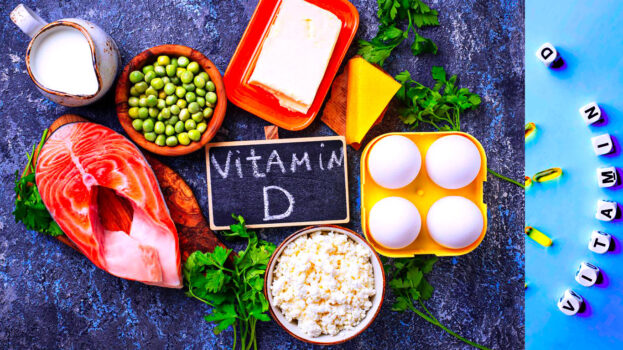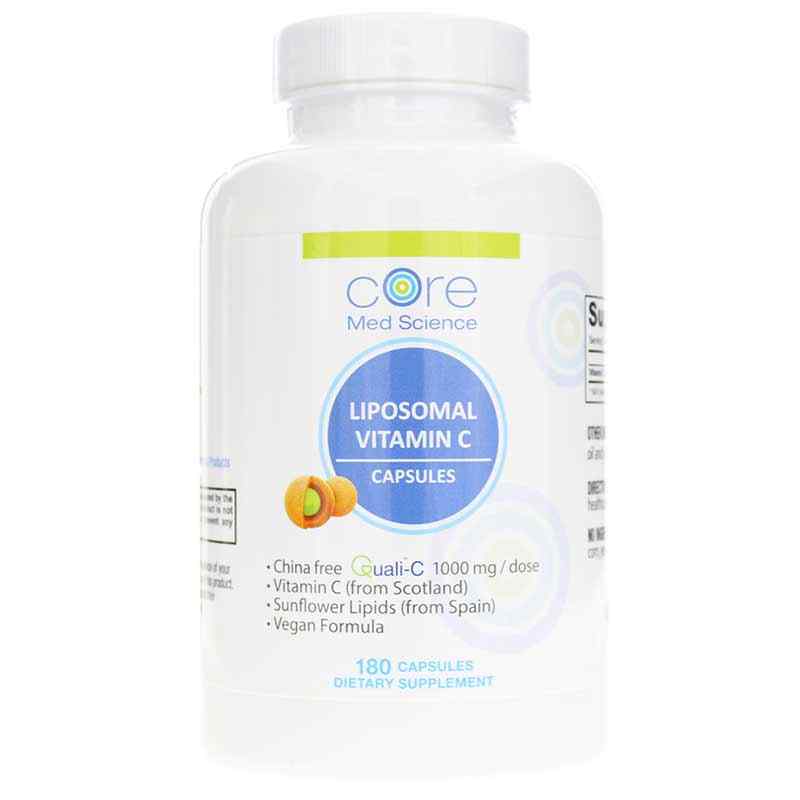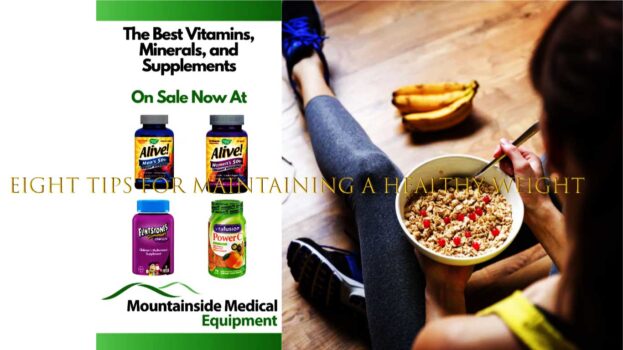Views: 59
Vitamin D is a vital nutrient your body needs to be in good health. It helps absorb calcium, the essential part of a body’s strong bones. Combined with calcium, it is preventing the development of osteoporosis and keeping your bones healthy and less likely to break. Besides the bones, your muscles and nerves need vitamin D too. The body’s immune system needs vitamin D to fight all body intruders like bacteria and viruses.
So these nutrients are keeping your bones, muscles, nerves, and teeth healthy.
A lack of it can lead to bone deformities and excruciating pain.
Vitamin D: Sources, Benefits, and Dosage
POSTED ON BY RAHUL MALLIK

Table Of Contents
How much vitamin D do I need?
It all depends on your age. The average recommended amounts per day vary from 10mcg (micrograms) for infants to 20mcg for elders above 71 years of age. You can check our table for the more detailed intake amounts in micrograms (mcg) and International Units (IU):
Life Stage Recommended Amount
| 0 to 1-year-old 10 mcg /400 IU |
| From 1–70 years 15 mcg /600 IU |
| From 71 years and older, 20 mcg /800 IU |
| Pregnant and breastfeeding women 20 mcg /600 IU |
Which foods are rich in vitamin D?
This is not a compound that you can find naturally in foods. There are just a few sources of natural vitamin D. Fatty fish like salmon, tuna, mackerel, and fish oils are some of the best natural sources of this precious compound. You can find some in beef liver, eggs, and cheese, and also in mushrooms. Some of them are exposed to ultraviolet light to increase their vitamin D content.
On the other hand, great sources are fortified foods, which also provide the most of the vitamin D intake for people across the United States.

The good thing is that nearly all milk in the US is fortified with vitamin D. And that’s not all, because all plant and vegan alternatives like soy and almond milk are also fortified. On the other hand, it’s important to say that foods made from milk (cheese, sour cream, cream cheese) aren’t fortified like milk alone.
Manufacturers add Vitamin D to almost all breakfast cereals, especially for kids, and orange juice, fruit yogurt, and other popular food products.
Is it true that you can get vitamin D from the sun?
When your skin is exposed directly to the sun, your body produces vitamin D. Most people usually get it this way. But there are some limitations to the amount your skin makes.
People of darker skin have lower melatonin levels, directly connected to the body’s amount.
Other limitations are connected to the age and sensitivity level a person has to direct sunlight exposure.
Direct exposure to sunshine can cause skin cancer due to ultraviolet radiation, so we must limit the time we spend in the sun. Another obstacle may be sunscreen which may lower vitamin D production but is highly recommended to protect us from ultraviolet radiation. Health practitioners recommend using a sun protection factor of 15 or more if we are about to spend more than a few minutes out in the sun.
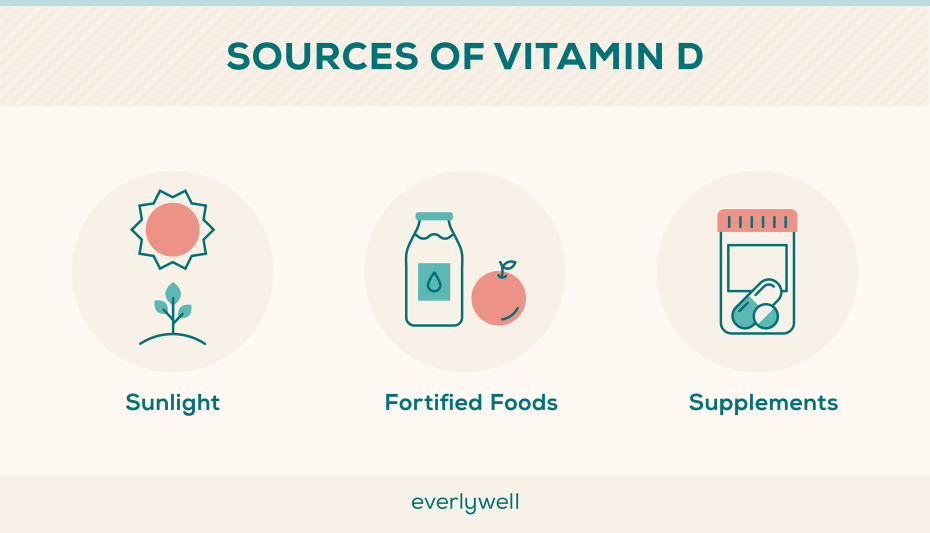
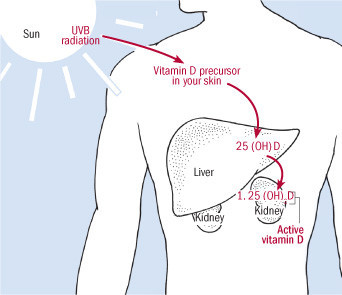
How your body makes vitamin D
Am I getting enough vitamin D?
You are usually getting your vitamin D from the Sun, foods, or dietary supplements. However, if you don’t know how much vitamin D you are actually getting, you can find out doing a blood test.
The good thing is that due to fortifying food, most people in the US have adequate levels of vitamin D. But, there are still a lot of people with low or inadequate levels of this vitamin for overall health.
Also, there are groups of people who have trouble getting enough of this vitamin:
Breastfed babies – The level in mothers’ milk doesn’t have a sufficient amount of this vitamin, so they must take up to 400IU each day.
People with Crohn’s, celiac disease, or ulcerative colitis. To put it more simply, if you have trouble absorbing fat, you will face difficulty getting enough vitamin D.
Obese people or gastric bypass surgery patients need more of it than other people.
Which vitamin D supplements are available on the market?
Many multivitamin supplements contain vitamin D. We can find it in two forms: D2 or ergocalciferol and D3 or cholecalciferol. Both of them can increase the actual blood level of the vitamin. Some findings suggest that D3 has better and longer effects than D2. This is a vitamin soluble in ft, so you better take it with food or drink that includes some fat.

VITAMIN D word for the healthy and medical concept. Sunshine vitamin health benefits
Are there consequences of not getting enough Vitamin D?
Vitamin D deficiency in children causes rickets. This is a severe disease where bones become deformed, soft, and painful. The lack in adults causes osteomalacia, which causes bone pain and muscle weakness.
How it affects health? Lets’ see:
Osteoporosis
Your bones can become fragile and break more easily if you aren’t getting enough vitamin D and calcium in your body. This condition called osteoporosis is a serious health problem for millions of women and men across the world. And combined with weak and painful muscles, it might get even worse. The vitamin D shortage could cause both of these problems, so it’s critical to take your daily dosage to prevent these situations.
Taking vitamin D and calcium from foods or otherwise will keep your bones healthy and prevent osteoporosis.
Heart disease
A healthy heart and blood vessels are best kept with maintaining normal blood pressure. Also, reducing high cholesterol levels and controlling blood pressure stable solve heart disease’s two main risk factors. It’s important to say that for overweight adults, taking high doses along with calcium could increase your blood pressure. It is better to be careful.
Multiple sclerosis
Multiple sclerosis or MS is a disease that affects the functioning of nerves which carry messages from the brain to the rest of the body. Certain studies find a link between low levels of vitamin D with the risk of developing MS. We cannot claim that supplements can prevent MS. Also, for people who already have MS, it is advised to get enough vitamin D through food and sunlight to prevent the disease from spreading too fast. We cannot say it is also valid for taking vitamin D supplements.
What about taking too much of Vitamin D?
Yes, getting too much vitamin D can be harmful. High blood levels of vitamin D in your blood can trigger several adverse effects like vomiting, nausea, loss of appetite and dehydration, excessive urination and thirst, and as the most severe, the forming of kidney stones. It is important to mention that taking extreme doses of this supplement can cause kidney failure and even death. We say supplement doses – since it’s impossible to overdose simply by exposing your body to the sun or taking it from foods. Your body cannot produce that amounts of vitamin D.
It’s important to tell your healthcare practitioner or doctor about all supplements you take to avoid any possible adverse effects. It’s because certain supplements interact with prescribed medicines, sometimes revoking any of their properties.
Taking large amounts over a long period might build up calcium in the body, causing a condition known as hypercalcemia. This condition weakens the bones and can damage the heart and kidneys.
If you choose to take supplements, 10 micrograms a day will be enough for most people.
Please do not take more than 100 micrograms /4,000 IU of vitamin D per day because it may cause adverse effects. Children aged 1 to 10 years should not have more than 50 micrograms /2,000 IU a day. The rate is even lower for infants under 1 year of age.
If your doctor recommends different amounts, you’d better follow his advice.
Eating Healthy
The federal government’s Dietary Guidelines for Americans suggest people get most of their nutrients from food and beverages. It’s mainly because a diverse diet contains enough nutrients, fiber, vitamins, and minerals that benefit health. Fortified foods and dietary supplements could help during specific life stages such as pregnancy or dealing with some medical conditions.
The body creates vitamin D from direct sunlight on the skin when outdoors. Unfortunately, we do not get enough vitamin D from sunlight during the winter months.
The usual food sources include:
- oily fish
- red meat and liver
- egg yolks
- Fortified foods and drinks
Or you can use dietary supplements combined with these foods.
You can buy vitamin D capsules, softgels, or drops for infants under 5 at most pharmacies and supermarkets. Because the Sun is not strong during the autumn and winter, you need to get it from foods or supplements.
And as we already discussed, it’s not easy to get sufficient amounts from the foods alone; everyone should include supplements of at least 10 micrograms of this vitamin. It especially means for pregnant or breastfeeding women or children.
People at risk of vitamin D deficiency
Some people will not get enough vitamin D from sunlight because they have very little or no sunshine exposure.
Anyway, you should take a daily supplement containing 10 micrograms of vitamin D throughout the year if you:
- are not often outdoors or housebound
- in a closed-type institution
- or been exposed to lockdowns during the COVID 19 pandemic
WRAP
So, you cannot overdose on vitamin D simply by getting it from the Sun. But always remember to cover up or protect your skin if you’re out in the sun for long periods to reduce the risk of skin damage and skin cancer. And if you are, on the contrary housebound, like working from home, you should use every second possible to get out and grab as much sunshine as possible.
Drink your coffee outdoors, walk a dog, or whatever looks appropriate to you. It’s good for the mind, and like we have already seen – it’s great for the body!
